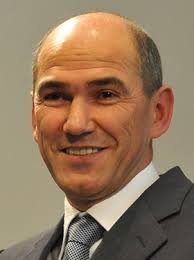Janez Janša
| Janez Janša | |
|---|---|
| Prime Minister of Slovenia | |
| In office
10 February 2012 – 20 March 2013 | |
| President | Danilo Türk |
| Preceded by | Borut Pahor |
| Succeeded by | Alenka Bratušek |
| Personal details | |
| Born | 17 September 1958 (age 55)
Grosuplje, Yugoslavia |
| Political party |
League of Communists (Before 1985) |
| Spouse(s) | Urška Bačovnik |
| Alma mater | University of Ljubljana |
| Profession | Politician |
Janez Jansa, born on September 17, 1958, is the leader of the Slovenian Democratic Party since 1993, and served as Minister of Defense from 1990 to 1994, during the War of Independence. He is the former Prime Minister of Slovenia from 2004 to 2008, and again from 2012 to 2013.
Biography
Janez Jansa joined the Defense Secretariat of the Socialist Slovenian Republic as a trainee. In 1983, Janez Jansa engaged in dissidence against the Yugoslav People’s Army (JNA), using the opportunity of the gradual lifting of restrictions on the freedom to speech to express its views in articles and publications. He also engaged at that time in the pacifist moment, being one of the movement’s first Slovenian figures. In 1989, he was a founding member and vice-president of one of the first Slovenian opposition parties, the Slovenian Democratic Union (SDZ). Following the country’s first free elections in 1990, he became Minister of Defense and served till 1994. In 1993, he was elected president of the SDZ and remained in that position till 2009. In 2004, he became Prime Minister of Slovenia and served until 2008, then was reappointed in 2012 till 2013. He had to resign in 2013, following protests accusing him of subordinating Slovenian media, which too closely resembled the old regime and abuse of power.
Education
Mr. Janez Jansa graduated from the university of Ljubljana in 1982 with a degree in defense studies.
Notable work
As Prime Minister Janez Jansa furthered economic and social reforms to increase welfare in Slovenia and improve the standard of living and during his term of office, the Republic of Slovenia became a recognisable and successful member of the European Union
Further information
The Initiative on the "Convention on the Prevention and Punishment of the Crime of Genocide"
